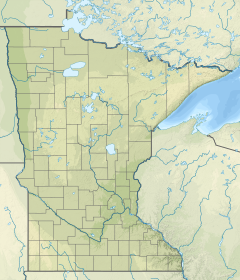Embarrass River (Minnesota)
| Embarrass River | |
|---|---|
 Embarrass River in Winter | |
| Location | |
| Country | United States |
| State | Minnesota |
| County | St. Louis County |
| Physical characteristics | |
| Source | |
| • location | Babbitt |
| • coordinates | 47°41′46″N 91°59′50″W / 47.6960296°N 91.9971046°W |
| Mouth | |
• location | Gilbert |
• coordinates | 47°23′32″N 92°24′52″W / 47.3921512°N 92.4143509°W |
| Length | 50.5-mile-long (81.3 km) |
| Basin features | |
| River system | Saint Louis River |
The Embarrass River is a 50.5-mile-long (81.3 km)[1] tributary of the Saint Louis River in northern Minnesota, United States. It rises just west of the city of Babbitt and flows southwest, turning briefly south to thread a gap between the Embarrass Mountains to the east and the Mesabi Range to the west. The river flows into the Saint Louis River southeast of Eveleth. During the fur-trading days and the era of exploration, the river was part of a historic trade route from Lower Canada via Lake Superior, across the Height of Land, and down the Rainy River to Lake Winnipeg to the pays d'en haut—the fur-bearing regions of the Canadian northwest.[2][3][4]
The river was so named on account of the many obstacles in the rivers to canoeists.[5]
See also
[edit]References
[edit]- ^ U.S. Geological Survey. National Hydrography Dataset high-resolution flowline data. The National Map Archived 2012-03-29 at the Wayback Machine, accessed May 7, 2012
- ^ U.S. Geological Survey Geographic Names Information System: Embarrass River
- ^ Morse, Eric (1979). Fur Trade Routes of Canada. Minoqua, WI: NorthWord Press. pp. 71–75. ISBN 1-55971-045-4.
- ^ Vogel, Robert C.; David G. Stanley (1992). "Portage Trails in Minnesota, 1630s-1870s" (pdf). Multiple Property Documentation Form. US Dept. of the Interior, Nat'l Park Service. Retrieved 2014-05-06.
- ^ Upham, Warren (1920). Minnesota Geographic Names: Their Origin and Historic Significance. Minnesota Historical Society. p. 482.
- Minnesota Watersheds
- USGS Hydrologic Unit Map - State of Minnesota (1974)

